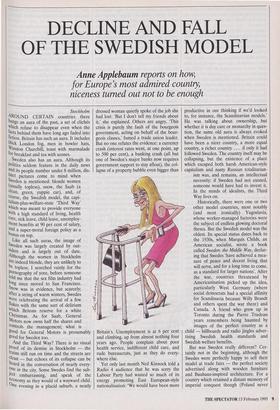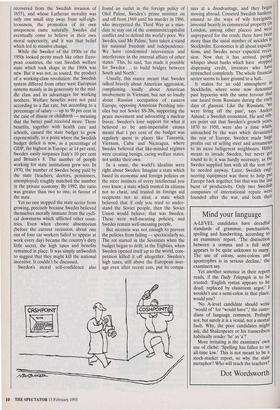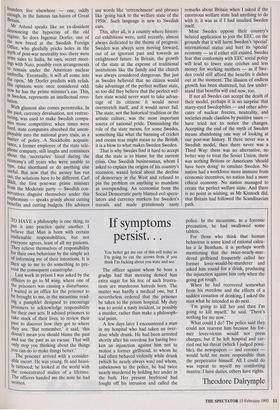DECLINE AND FALL OF THE SWEDISH MODEL
Anne Applebaum reports on how,
for Europe's most admired country, niceness turned out not to be enough
Stockholm AROUND CERTAIN countries there bangs an aura of the past, a set of clichés which refuse to disappear even when the facts behind them have long ago faded into fiction. Britain has such an aura. It includes thick London fog, men in bowler hats, Winston Churchill, toast with marmalade for breakfast and tea with scones.
Sweden also has an aura. Although its
Politics seldom feature in the daily news and its people number under 8 million, dis- tinct pictures come to mind when Sweden is mentioned: blonde women (usually topless), snow, the Saab (a clean, green, yuppie car), and, of course, the Swedish model, the capi- talism-plus-welfare-state 'Third Way' which was meant to provide everyone with a high standard of living, health care, sick leave, child leave, unemploy- ment benefits at 90 per cent of salary, and a super-moral foreign policy as a bonus on top.
Like all such auras, the image of
Sweden was largely created by out- siders and is largely out of date. Although the women in Stockholm are indeed blonde, they are unlikely to be topless; I searched vainly for the Pornography of yore, before someone told me that the sex film industry had long since moved to San Francisco. Snow was in evidence, but scarcely; after a string of warm winters, Swedes were celebrating the arrival of a few flakes with the same sort of delirium Which Britons reserve for a white Christmas. As for Saab, General Motors now owns half the shares and controls the management; what is good for General Motors is presumably good for Sweden too.
And the Third Way? There is no visual
Proof of its demise in Stockholm — the trains still run on time and the streets are clean — but echoes of its collapse can be heard in the conversation of nearly every- one in the city. Some Swedes find the sub- ject embarrassing, and speak of the economy as they would of a wayward child. One evening in a placid suburb, a neatly
dressed woman quietly spoke of the job she had lost: 'But I don't tell my friends about it,' she explained. Others are angry. 'This crisis is purely the fault of the bourgeois government, acting on behalf of the bour- geois classes,' fumed a trade union leader. But no one refutes the evidence: a currency crash (interest rates went, at one point, up to 500 per cent), a banking crash (all but one of Sweden's major banks now requires government support to stay afloat), the col- lapse of a property bubble even bigger than Britain's. Unemployment is at 6 per cent and climbing, up from almost nothing four years ago. People complain about poor health service, indifferent child care, and rude bureaucrats, just as they do every- where else.
Yet only last month Neil Kinnock told a Radio 4 audience that he was sorry the Labour Party had wasted so much of its energy promoting East European-style nationalisation: 'We would have been more productive in our thinking if we'd looked to, for instance, the Scandinavian models.' He was talking about ownership, but whether it is day care or monarchy in ques- tion, the same old aura is always evoked when Sweden is mentioned. Britain could have been a nicer country, a more equal country, a richer country . . . if only it had followed Sweden. The country itself may be collapsing, but the existence of a place which escaped both harsh American-style capitalism and nasty Russian totalitarian- ism was, and remains, an intellectual necessity: if Sweden had not existed, someone would have had to invent it.
In the minds of idealists, the Third Way lives on.
Historically, there were one or two other model countries, most notably (and most ironically) Yugoslavia, whose worker-managed factories were the subject of endless glowing doctoral theses. But the Swedish model was the oldest. Its special status dates back to the 1930s, when Marquis Childs, an American socialist, wrote a book called Sweden: the Middle Way, declar- ing that Swedes 'have achieved a mea- sure of peace and decent living that will serve, and for a long time to come, as a standard for larger nations'. After the war, countries threatened by Americanisation picked up the idea, particularly West Germany (where social democrats had a special affinity for Scandinavia because Willy Brandt and others spent the war there) and Canada. A friend who grew up in Toronto during the Pierre Trudeau years remembers being haunted by images of the perfect country as a
child — billboards and radio jingles adver- tising Swedish health standards and Swedish welfare benefits.
But was Sweden really different? Cer- tainly not in the beginning, although the Swedes were perfectly happy to sell their model at trade fairs — the perfect society advertised along with wooden furniture and Bauhaus-inspired architecture. For a country which retained a distant memory of imperial conquest though (Poland never recovered from the Swedish invasion of 1655), and whose Lutheran morality was only one small step away from self-righ- teousness, the promotion of its own uniqueness came naturally. Swedes did eventually come to believe in their own moral superiority, and it was that belief which led to massive change.
While the Sweden of the 1930s or the 1950s looked pretty much like other Euro- pean countries, the vast Swedish welfare state which took shape in the 1960s was new. But it was not, as touted, the product of a working-class revolution: the Swedish system differed from other west European systems mainly in its generosity to the mid- dle class and its advantages for working mothers. Welfare benefits were not paid according to a flat rate, but according to a percentage of salary — up to 90 per cent in the case of illness or childbirth — meaning that the better paid received more. These benefits, together with health care and schools, caused the state budget to grow exponentially, to a point where the Swedish budget deficit is now, as a percentage of GDP, the highest in Europe: at 14 per cent, Sweden easily surpasses Italy's 10 per cent and Britain's 8. The number of people working for state institutions grew too. In 1970, the number of Swedes being paid by the state (teachers, doctors, pensioners, unemployed) roughly matched the number in the private economy. By 1992, the ratio was greater than two to one, in favour of the state.
Yet no one stopped the state sector from growing, precisely because Swedes believed themselves morally immune from the cycli- cal downturns which afflicted other coun- tries. Even when chronic absenteeism (before the current recession, about one out of four car workers failed to appear at work every day) became the country's dirty little secret, the high taxes and benefits remained in place. It was simply unSwedish to suggest that they might kill the national incentive. It couldn't be discussed.
Sweden's moral self-confidence also found an outlet in the foreign policy of Olof Palme, Sweden's prime minister on and off from 1969 until his murder in 1986, who interpreted the Third Way as a man- date to stay out of the communist/capitalist conflict and to defend the world's poor. We Swedes, said Mr Palme, 'have taken a stand for national freedom and independence. We have condemned intervention and interference in the internal affairs of other states.' This, he said, 'has made it possible for Sweden . . . to build bridges between South and North'.
Usually, this stance meant that Swedes talked bravely about American aggression, complaining loudly about American involvement in Vietnam, but not so loudly about Russian occupation of eastern Europe, opposing American Pershing mis- siles but not Soviet SS-20s, supporting the peace movement and advocating a nuclear freeze. Sweden's lone support for what it believed to be anti-imperialist causes meant that 1 per cent of the budget was regularly spent in places like Tanzania, Vietnam, Cuba and Nicaragua, where Swedes believed that like-minded regimes were creating benign, caring welfare states, not unlike their own.
In a sense, the world's idealists were right about Sweden. Imagine a state which based its economic and foreign policies on the nicer instincts of every intellectual you ever knew; a state which trusted its citizens not to cheat, and trusted its foreign aid recipients not to steal; a state which believed that if only you tried to under- stand the Soviet people, then the Soviet Union would behave; that was Sweden. These were well-meaning policiq, and Swedes remain well-meaning people.
But niceness was not enough to prevent the policies from failing — spectacularly so. The rot started in the Seventies when the budget began to drift; in the Eighties, when Sweden opened itself up to the world, com- petition killed it off altogether. Sweden's high taxes, still above the European aver- age even after recent cuts, put its compa- nies at a disadvantage, and they began moving abroad. Cosseted Swedish bankers, unused to the ways of wily foreigners, invested heavily in commercial property (10 London, among other places) and were unprepared for the crash; there have been more than the usual number of suicides in Stockholm. Economics is all about expecta- tions, and Swedes never expected reces- sion. Now that it has arrived, peoPle . whisper about banks which have stopped dispensing credit, investors who have retrenched completely. The whole financial sector seems to have ground to a halt. It makes for an odd atmosphere in Stockholm, where some now denounce past hypocrisy with the same fervour that one heard from Russians during the earlY days of glasnost. Like the Russians, 'we were living off the past', says Anders Aslund, a Swedish economist. He and oth- ers point out that Sweden's growth years, 1870 to 1950, were also a time when, untouched by the wars which devastated the rest of Europe, Sweden made huge profits out of selling steel and armaments to its more belligerent neighbours. Hitler meant to invade Sweden, but never got round to it; it was hardly necessary, as the Swedes supplied him with all the iron ore he needed anyway. Later, Swedish engl. neering equipment was there to help put Europe back together, but that was the last burst of productivity. Only two Swedish companies of international repute were founded after the war, and both their
Mind your language
A-LEVEL candidates have dreadful standards of grammar, punctuation, spelling and handwriting, according to an examiners' report. `The distinction between a comma and a full stop appears to be quite unknown to many. The use of colons, semi-colons and apostrophes is in serious decline,' the examiners say.
Yet another sentence in their report reads, if the Daily Telegraph is to be trusted: 'English syntax appears to be dead; replaced by classroom argot.' I wouldn't use a semi-colon in that place, would you?
`No A-level candidate should write "would of for "would have",' the custo- dians of language comment. Perhaps not, but surely it is a venial, not a mortal fault. Why, the poor candidates might ask, did Shakespeare or his transcribers habitually render 'he' as 'a'?
More irritating is the examiners' own use of clich8: 'Spelling has fallen to an all-time low.' This is not meant to be a stock-market report, so why the stale metaphor? Who will teach the teachers?
Dot Wordsworth
founders live elsewhere — one, oddly enough, in the famous tax-haven of Great Britain,
Mr Aslund speaks like an ex-dissident denouncing the hypocrisy of the old regime. So does Ingemar Dorfer, one of the new breed at the Swedish Foreign office, who gleefully pricks holes in the nlYth of post-war neutrality too: there were arms sales to India, he says, secret meet- ings with Nato, possibly even arrangements to remain under the American nuclear umbrella. 'Eventually, it will all come into the open,' Mr Dorfer predicts with relish. His opinions were once considered odd; tlth,v he has the prime minister's ear. This, In Sweden, represents an intellectual revo- lution.
With glasnost also comes perestroika. In the, past, currency devaluation, not restruc- turing, was used to make Swedish compa- nies more competitive; when times were hard, state companies absorbed the unem- Playable into the national gravy train, as a 'natter of policy. A Stockholm acquain- tance, a former employee of the state tele- Phone company, still laughs and reminisces about the 'secretaries' hired during the economy's off years who were unable to tYPe, take shorthand or do anything else useful. But now that the money has run out, the solutions have to be different. Carl aildt, the first post-war prime minister from the Moderate party — Swedish con- servatives disguise themselves under this euphemism — speaks grimly about cutting benefits and cutting budgets. His advisers
use words like 'retrenchment' and phrases like 'going back to the welfare state of the 1950s'. Such language is new to Swedish ears.
This, after all, is a country where histori- cal exhibitions were, until recently, almost always dedicated to the theme of progress: Sweden was always seen moving forward, out of an ignorant past and towards an enlightened future. In Britain, the growth of the state at the expense of traditional institutions like the family and the church was always considered dangerous. But just as Swedes believed that no citizen would take advantage of the perfect welfare state, so too did they believe that the perfect wel- fare state would never want to take advan- tage of its citizens: it would never overstretch itself, and it would never fail. The state, not the historical tradition or the artistic culture, was the most important source of national pride. Diminishing the role of the state means, for some Swedes, something like what the banning of cricket and cream teas might mean to the British; it is a blow to what makes Sweden Sweden.
That is why Swedes find it hard to accept that the state is to blame for the current crisis. One Swedish businessman, whom I asked to explain the origins of his country's recession, waxed lyrical about the decline of democracy in the West and refused to pin the problem on anything so mundane as overspending. An economist from the Social Democratic party blamed evil specu- lators and currency markets for Sweden's travails and made gratuitously nasty remarks about Britain when I asked if the enormous welfare state had anything to do with it; it was as if I had insulted Sweden itself.
Most Swedes oppose their country's belated application to join the EEC, on the grounds that it will harm Sweden's 'special' international status and hurt its 'special' economy — as if either still existed. Swedes fear that conformity with EEC social policy will lead to fewer state creches and less money for working mothers — as if Swe- den could still afford the benefits it dishes out at the moment. The illusion of endless growth has been shattered, but few under- stand that benefits will end now, too.
If not all Swedes can accept the death of their model, perhaps it is no surprise that starry-eyed Swedophiles — and other advo- cates of nuclear freezes, neutrality, and societies made classless by punitive taxes have tried not to notice the changes. Accepting the end of the myth of Sweden means abandoning one way of looking at our post-war history. If there never was a Swedish model, then there never was a Third Way: there was no alternative, no better way to treat the Soviet Union, there was nothing Britons or Americans 'should have been doing' to emulate Sweden. No nation had a workforce more immune from economic incentives, no nation had a more ethical economy. No nation managed to create the perfect welfare state. And there is no point in wishing, as Mr Kinnock did, that Britain had followed the Scandinavian path.




















































 Previous page
Previous page